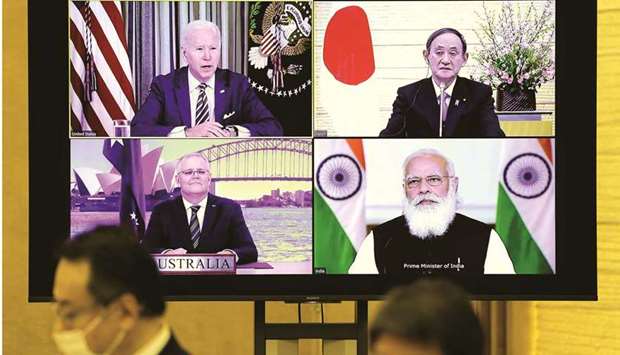US President Joe Biden met leaders of Australia, India and Japan yesterday, a group central to his efforts to counter China’s growing military and economic power, and said a free and open Indo-Pacific region was crucial to all of them.
The White House says the virtual meeting of the countries known as the Quad, the first at leader level, shows the importance Biden places on the Indo-Pacific region and that it will focus on tackling the coronavirus pandemic and the climate crisis, and on reviving economic growth.
“A free and open Indo-Pacific is essential to each of our futures,” Biden told the meeting from the White House. “The US is committed to working with you, our partners, and all our allies in the region, to achieve stability.”
Japanese Prime Minister Yoshihide Suga said he wanted the four “to forge strongly ahead toward the realisation of a free and open Indo-Pacific”. India and Australia also emphasised the importance of regional security co-operation, which has been enhanced by previous lower-level Quad meetings.
A senior US official told reporters yesterday’s meeting involved “an honest, open discussion about China’s role on the global stage,” referencing “challenges in the region” to free and open trade and commerce.
The Biden administration has said the Quad nations will announce financing agreements to support an increase in manufacturing capacity for coronavirus vaccines in India, something New Delhi has called for to counter Beijing’s widening vaccine diplomacy.
The virtual meeting, which also included Australian Prime Minister Scott Morrison and Indian Prime Minster Narendra Modi, aims to lay the groundwork for an in-person meeting later this year, the administration said.
Modi told the session the Quad had “come of age” and would “now remain an important pillar of stability in the region”.
Earlier, Morrison told reporters: “When governments come together at the highest level, this shows a whole new level of co-operation to create a new anchor for peace and stability in the Indo-Pacific.”
Among the issues to be addressed are supply chains exposed as heavily reliant on China during the pandemic.
Japan’s Nikkei newspaper reported on Thursday that the four countries would also work together to secure rare earth metals essential for electric car motors and other products.
The Biden administration told Reuters on Tuesday the US and Japan would help fund Indian firms manufacturing vaccines for US drugmakers Novavax and J&J.
However, Indian government sources say US curbs on exports of critical materials could hamper that effort and those to start large-scale distribution to Southeast Asia.
India, Australia and Japan have all faced security challenges from China, strengthening their interest in the Quad. Quad co-operation dates back to their joint response to the Indian Ocean earthquake and tsunami in 2004.
The Quad was revived under the Trump administration, which saw it as a vehicle to push back against China.
The US hosted a foreign ministers’ meeting in 2019, which was followed by another in Japan last year and a virtual session in February. Yesterday’s meeting coincides with a major US diplomatic drive to solidify alliances in Asia and Europe to counter China, including visits next week by Secretary of State Antony Blinken and Defence Secretary Lloyd Austin to Japan and South Korea.

A monitor displaying the virtual meeting of US President Joe Biden (top left), Australia’s Prime Minister Scott Morrison (bottom left), Japan’s Prime Minister Yoshihide Suga (top right) and India’s Prime Minister Narendra Modi is seen during the virtual Quadrilateral Security Dialogue (Quad) meeting, at Suga’s official residence in Tokyo yesterday.
